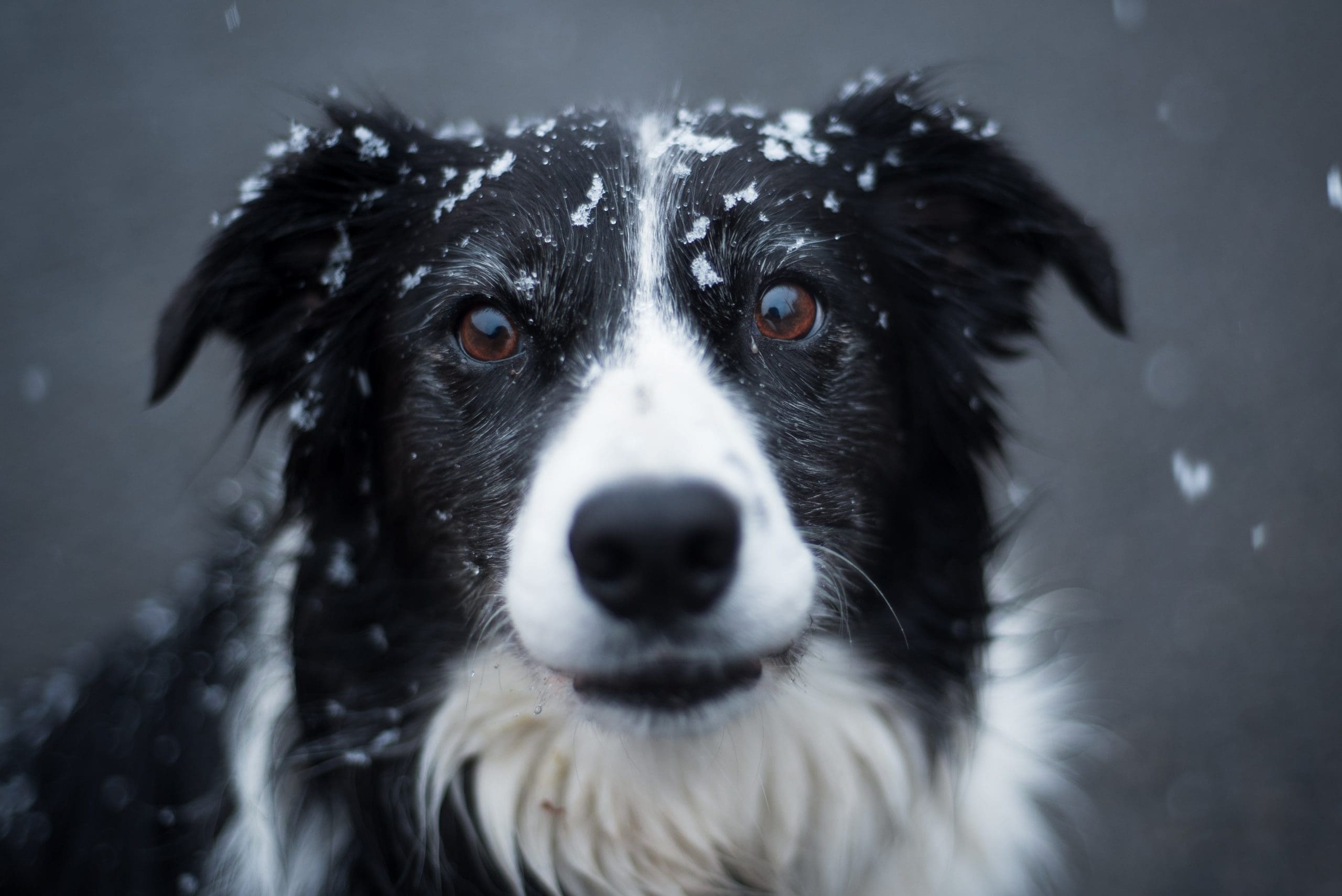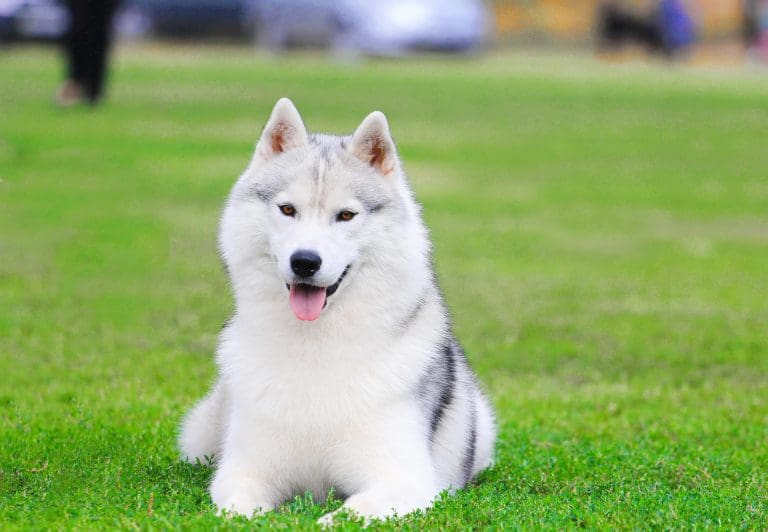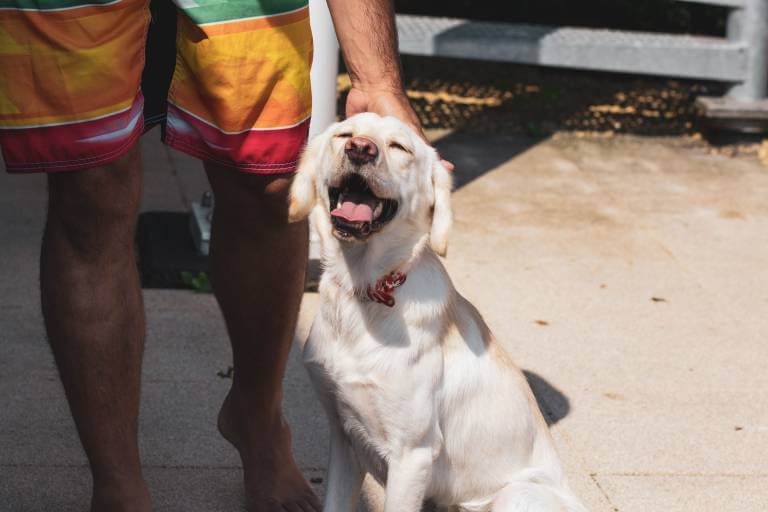Why Do Dogs Lick Their Paws?
Post Date:
December 10, 2024
(Date Last Modified: November 13, 2025)
Dogs commonly use their mouths and tongues to clean and inspect their paws, and the behavior can have many normal and pathological causes.
Normal grooming behavior
Grooming with the tongue helps remove dirt, dry the pads, and dislodge small debris from interdigital spaces.
Typical brief grooming episodes usually last under 2 minutes and occur about 2–5 times per day in many healthy dogs [1].
Veterinarians often classify licking as persistent if it exceeds 20 minutes per day or recurs daily for more than 2 weeks, because that pattern more strongly suggests an underlying issue rather than routine maintenance [2].
Paw anatomy relevant to licking
A typical canine paw includes four digital pads and one larger metacarpal or metatarsal pad, plus claws and often minor scent glands around the interdigital skin [3].
The pads and tight interdigital spaces trap small particles, and the skin in these areas has a higher sensory nerve density than many surrounding regions, which both magnifies irritation and makes licking a rewarding, attention‑directed behavior [3].
Small foreign objects such as grass awns and burrs commonly measure 0.2–0.5 in (5–12 mm) and can lodge between pads or under nails, prompting focused licking and chewing [4].
Allergies (environmental and food)
Allergic disease is a frequent driver of chronic paw licking; seasonal inhalant allergens produce waxing and waning signs, while food hypersensitivity often produces year‑round paw chewing and licking [5].
Food elimination trials are typically run for 8–12 weeks to assess response before declaring a food allergy, because clinical improvement can be gradual over that interval [5].
Common clinical signs of allergic paw disease include redness, hair loss, licking with secondary odor, and recurrent infections that may require topical or systemic therapy [5].
Infections and parasites
Yeast overgrowth (Malassezia) and superficial bacterial infections are common causes of localized paw licking; some clinical series report Malassezia in up to about 12% of canine dermatology cases evaluated at specialty clinics [6].
Bacterial pyoderma frequently responds to 2–3 weeks of appropriately chosen systemic antibiotics when infection is confirmed by cytology or culture [6].
External parasites such as fleas and certain mites provoke intense pruritus; scabies infestations may require environmental measures plus multiple acaricidal treatments spaced according to the parasite life cycle, which can span several weeks [2].
Pain, injury, and foreign bodies
Acute paw pain from cuts, nail injuries, or embedded foreign bodies typically causes localized, focused licking often accompanied by limping or favoring the limb [4].
Common foreign bodies such as grass awns can be 0.2–1.0 in (5–25 mm) long and migrate under the skin, so persistent localized licking plus swelling warrants careful inspection and prompt veterinary evaluation [4].
If lameness, persistent swelling, or bleeding continues beyond 24–48 hours after an obvious injury, veterinary attention is recommended to rule out infection or deeper tissue damage [6].
Dermatologic irritants and chemical exposures
Contact with de‑icing salts, lawn chemicals, household cleaners, or certain plant saps commonly causes acute irritation of pads and interdigital skin; signs can appear within hours after exposure [4].
Cleaning the paws after walks and avoiding treated lawns or freshly applied herbicides reduces exposure; barrier products or protective booties can be effective interim measures [4].
Stress, anxiety, and compulsive licking
Psychogenic or compulsive licking is a recognized cause of chronic paw‑focused behavior and is often linked to separation anxiety, boredom, or repetitive stimulation; in severe cases dogs may lick for 30–60 minutes or more per day [2].
Behavior modification programs commonly require structured environmental enrichment and a dedicated plan for at least 6–12 weeks to see measurable reductions in compulsive behaviors [3].
When behavior modification alone is insufficient, veterinarians may add pharmacologic support as part of a multi‑modal plan tailored to the dog’s diagnosis and severity [3].
Owner reinforcement and learned habits
Human responses that provide attention or treats during or after licking can inadvertently reinforce the behavior; consistent nonresponse and redirection to an alternative activity are core strategies to extinguish habitual licking [6].
Extinction and redirection programs often require daily consistency for 2–4 weeks before owners see a meaningful decline in the habit if no medical cause is present [6].
Breed, age, and individual risk factors
Certain breeds with predispositions to atopic dermatitis or recurrent skin disease (for example, retriever types and terriers) appear more commonly in dermatology caseloads, with some studies suggesting roughly a twofold increased risk compared with the general dog population for particular conditions [5].
Age matters: puppies often lick during teething and exploratory stages, whereas older dogs may develop immune or endocrine conditions that increase skin infections and licking; immune function changes are more common after about 8 years of age in many medium‑to‑large breeds [5].
Concurrent factors such as obesity and endocrine disease (hypothyroidism, Cushing disease) raise the overall risk of chronic skin problems and therefore persistent paw licking [5].
Diagnosis, monitoring, and when to see a veterinarian
Red flags that merit prompt veterinary assessment include open sores, persistent bleeding, marked swelling, or systemic signs such as an elevated temperature over 103°F (39.4°C) [1].
Diagnostic steps commonly include a thorough history, physical exam, superficial cytology performed in minutes, and, when indicated, bacterial or fungal culture with results available in about 48–72 hours [1].
Follow‑up expectations vary by diagnosis; bacterial infections often improve within 48–72 hours of appropriate therapy, while allergies and behavioral causes usually require weeks to months of management to show durable improvement [3].
Treatment, management, and prevention strategies
Treatment is cause‑specific and may include topical antiseptics or antifungals, systemic antibiotics or antifungals for confirmed infections, antiparasitic agents for parasite‑driven pruritus, and behavioral or pharmacologic interventions for psychogenic licking [1].
Maintenance and supportive measures often include regular paw cleaning, short‑term use of protective booties for walks up to 30–60 minutes, and trimming of interdigital hair to reduce debris trapping [4].
For dogs needing fluid maintenance while ill, standard maintenance rates are commonly estimated at about 50 mL/kg/day (with adjustments per clinical judgment) [6].
- Immediate home care: clean the paw with lukewarm water and a mild cleanser after exposure to irritants; avoid home use of topical steroids without veterinary guidance [4].
- Short-term protection: padded bandages or an Elizabethan collar to prevent self‑trauma while healing is underway [1].
- Long-term prevention: scheduled grooming, environmental allergen reduction, parasite control, and structured enrichment to reduce stress‑related licking [3].
| Cause | Typical signs | Key diagnostic test | Initial action |
|---|---|---|---|
| Allergy | Red, itchy paws; seasonal pattern | History, elimination diet, intradermal or serologic testing | Allergen avoidance, anti‑inflammatories, allergy workup |
| Infection (yeast/bacteria) | Odor, discharge, crusting | Cytology ± culture | Topical/systemic antimicrobials |
| Foreign body / trauma | Localized licking, limping, swelling | Exam ± imaging | Removal, wound care, pain control |
| Behavioral/compulsive | Excessive licking without clear lesion | Behavioral history, rule out medical causes | Enrichment, training, possible medication |
Follow-up care and prognosis
After the initial veterinary visit, a practical recheck schedule helps confirm that the chosen therapy is working and that self‑trauma is controlled.
For superficial bacterial infections, clinicians usually expect a measurable reduction in redness and discharge within 48–72 hours of starting appropriate systemic or topical antibiotics, with full resolution commonly by 2–3 weeks when treatment and wound care are adequate [1].
Yeast infections treated with topical antifungals often show clinical improvement within 7–14 days, but many protocols continue therapy for 2–4 weeks to reduce recurrence risk [1].
When an allergic cause is suspected and an elimination diet is used, owners should expect a diagnostic trial of about 8–12 weeks before concluding a food‑related problem has been excluded or confirmed [5].
Behavioral interventions typically require commitment: structured enrichment and training programs are commonly evaluated over 6–12 weeks to judge effectiveness before considering medication adjustments [3].
Practical home care and timelines
Wound care and protective measures can prevent progression while definitive treatment takes effect. Clean the paw with lukewarm water and a mild cleanser after known exposure to irritants or before bandage application [4].
Padded bandages intended to protect a healing pad or interdigital wound are generally changed every 24–48 hours to check for moisture, odor, or new discharge that would indicate infection [1].
An Elizabethan collar is often recommended for an initial period of 7–14 days when self‑trauma threatens to prevent healing, with the exact duration tailored to lesion severity and owner compliance [4].
Protective booties can be useful for short walks while a paw heals; many clinicians advise limiting bootie use to 30–60 minutes per outing to avoid moisture buildup and to allow routine paw inspection at home [4].
Owners should expect to report improvement for most uncomplicated infections within 48–72 hours and to schedule a recheck or communicate with their veterinarian at that point if there is no improvement [1].
Medications and typical regimens
Topical antiseptics and antifungals are commonly applied once or twice daily depending on product formulation; directions on label or veterinary guidance should be followed exactly [1].
Systemic antibiotics for confirmed superficial pyoderma are often prescribed for 2–3 weeks, and clinicians may extend therapy based on clinical response and culture results [6].
For parasite control, modern oral or topical flea control products are typically dosed every 30 days, with many veterinarians recommending at least a 3‑month continuous program when fleas are implicated in seasonal flares [2].
When psychiatric medication is added to address compulsive licking, veterinarians usually start with a trial of 6–12 weeks to determine efficacy while concurrent behavior modification continues [3].
Nutrition, supplements, and adjunct therapies
Essential fatty acid supplementation is frequently used as an adjunct for skin health; dosing and expected timelines vary by product, but clinical benefit for skin condition is frequently evaluated over 8–12 weeks [5].
Owners should be cautious with over‑the‑counter topical remedies: some products can worsen irritation or delay appropriate care, so a veterinary recommendation for specific barrier creams or cleansers is preferable [1].
When to seek immediate veterinary attention
Immediate care is indicated for signs of acute infection or systemic illness: marked swelling, persistent bleeding, signs of severe pain or lameness, or a rectal or oral temperature above 103°F (39.4°C) should prompt urgent evaluation [1].
If a foreign body is suspected to be migrating (for example, a grass awn producing increasing swelling or heat at an entry site), diagnostic imaging or surgical removal should not be delayed because migration can occur over days to weeks and produce deep infection [4].
Owners noticing new systemic signs such as lethargy or appetite loss concurrent with paw lesions should arrange veterinary assessment within 24 hours, since systemic spread or pain‑related anorexia can require prompt intervention [6].
Long‑term prevention and lifestyle adjustments
Regular paw inspection after walks and trimming of long interdigital hair reduces debris trapping and can lower the risk of recurrent irritation; many groomers and clinicians recommend checking paws after each walk in high‑risk seasons [4].
For dogs with environmental allergy, targeted strategies such as avoiding high‑pollen times, washing paws after outdoor activity, and frequent bedding cleaning are practical steps that dovetail with medical therapy to reduce relapse frequency [5].
Weight management is an important long‑term factor: obese dogs have more skin folds and harder‑to‑inspect areas, and weight loss programs that aim for a gradual reduction over months can decrease dermatitis risk in susceptible individuals [6].
Key owner takeaways
Brief, occasional paw licking for cleaning is normal, but persistent or progressively worsening licking—especially when accompanied by redness, odor, limping, or open wounds—warrants veterinary evaluation [1].
Treatable causes have different typical timelines: infections often respond within days to a few weeks, allergies and behavioral issues commonly require multi‑week or multi‑month plans, and foreign bodies may need prompt removal to prevent deeper problems [1].
Consistent home care, avoidance of known irritants, and follow‑through with rechecks and diagnostics are the most reliable ways to reduce recurrence and protect paw health over the long term [4].






